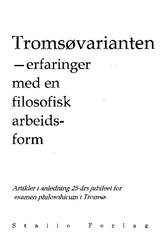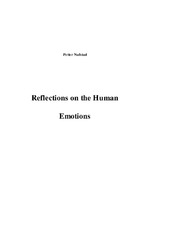Blar i utgivelsesdato Artikler, rapporter og annet (filosofi og førstesemesterstudier)
Viser treff 1-20 av 138
-
Tromsøvarianten - erfaringer med en filosofisk arbeidsform.
(Book; Bok, 1997)Artikler i anledning 25-års jubileet for examen philosophicum i Tromsø. <br><br>Da Universitetet i Tromsø mottok sitt aller første kull av studenter, 1. september 1972, var det allerede bestemt at det alt vesentlige av studentenes første semester skulle være viet arbeidet med examen philosophicum. 25 år etter at de første ex.phil.-studentene ved Universitetet i Tromsø kunne gå på forelesninger og ... -
Samtale og sannhet hos Gadamer og Rorty
(Journal article; Tidsskriftartikkel, 2000)I dette paperet vil jeg ta for meg Hans-Georg Gadamers filosofiske hermeneutikk, og se den i forhold til Richard Rortys utlegning av hermeneutikken som “edification”. Dette gjør jeg ved å først ta for meg noen trekk ved Gadamers prosjekt slik det framstår i Warheit und Metode, og deretter vil jeg se på den bruk som Rorty gjør av Gadamers hermeneutikk slik det kommer til uttrykk i Philosophy and ... -
Velvillighetsprinsippets epistemiske status
(Journal article; Tidsskriftartikkel; Peer reviewed, 2004) -
Review of John Hawthorne’s Knowledge and Lotteries
(Journal article; Tidsskriftartikkel; Peer reviewed, 2006) -
Kunnskaps-sosiologi, relativisme og anti-realisme – ein gjennomgang av Kuhn, Wittgenstein, Winch og Bloor
(Journal article; Tidsskriftartikkel; Peer reviewed, 2007)The problem of relativism and realism may appear in hermeneutic and mundane phenomenological projects. In this paper theories of Kuhn, Wittgenstein, Winch, and Bloor are discussed. Kuhn’s theory may be interpreted in at least two ways, one generating the problem of relativism and realism, the second avoiding the problem. Wittgenstein’s treatment of reciprocal understanding across cultural borders ... -
Reflections on the Human Emotions
(Book; Bok, 2011)<p>The usual way to approach the philosophical study of emotions is to start out from our emotional experiences. The feelings of anger, joy, envy, fear, sadness and so on, that we have all experienced are taken as the given facts, the data, and the research is carried out as an investigation of what is implied and presupposed in such experiences. Such approaches will reveal that emotional states ... -
Mennyire lehet nehéz? A túlzott követelések ellenvetésének újszerű megközelítései
(Journal article; Tidsskriftartikkel, 2012) -
Causation and evidence-based practice: an ontological review
(Journal article; Tidsskriftartikkel; Peer reviewed, 2012-09-21)This paper explores the nature of causation within the framework of evidence-based practice (EBP) for health care. The aims of the paper were first to define and evaluate how causation is presently accounted for in EBP; second, to present an alternative causal account by which health care can develop in both its clinical application and its scientific research activity. The paper was premised on the ... -
Dispositions and Ethics
(Chapter; Bokkapittel, 2012-12-18) -
At the borders of medical reasoning - aetiological and ontological challenges of medically unexplained symptoms
(Journal article; Tidsskriftartikkel; Peer reviewed, 2013)Medically unexplained symptoms (MUS) remain recalcitrant to the medical profession, proving less suitable for homogenic treatment with respect to their aetiology, taxonomy and diagnosis. While the majority of existing medical research methods are designed for large scale population data and sufficiently homogenous groups, MUS are characterised by their heterogenic and complex nature. As a result, ... -
No Need to Get Emotional? Emotions and Heuristics
(Journal article; Tidsskriftartikkel; Peer reviewed, 2013)Many believe that values are crucially dependent on emotions. This paper focuses on epistemic aspects of the putative link between emotions and value by asking two related questions. First, how exactly are emotions supposed to latch onto or track values? And second, how well suited are emotions to detecting or learning about values? To answer the first question, the paper develops the heuristics-model ... -
Causation in Evidence-Based Medicine: In reply to Strand and Parkkinen
(Journal article; Tidsskriftartikkel; Peer reviewed, 2014)Strand and Parkkinen criticize our dispositional account of causation in evidence-based medicine for failing to provide a proper epistemology of causal knowledge. In particular, they claim that we do not explain how causal inferences should be drawn. In response, we point out that dispositionalism does indeed have an account of the epistemology of causation, including counterfactual dependence, ... -
Kvinnens Overflødighet hos Platon
(Journal article; Tidsskriftartikkel; Peer reviewed, 2014) -
Nød, plikt og barmhjertighet - En kritisk analyse av Peter Singers etikk
(Journal article; Tidsskriftartikkel; Peer reviewed, 2014) -
Getting personal: Can systems medicine integrate scientific and humanistic conceptions of the patient?
(Journal article; Tidsskriftartikkel; Peer reviewed, 2014) -
Sokrates og oss: Et essay om Sokrates’ forsvarstale, tekstfortolkning og filosofihistorie
(Journal article; Tidsskriftartikkel; Peer reviewed, 2014)Socrates and Us: An Essay on the Apology of Socrates, Philological Interpretations and History of Philosophy. -
How to Gauge Moral Intuitions? Prospects for a New Methodology
(Chapter; Bokkapittel, 2014)Examining folk intuitions about philosophical questions lies at the core of experimental philosophy. This requires both a good account of what intuitions are and methods allowing to assess them. In the paper we propose to combine philosophical and psychological conceptualisations of intuitions by focusing on three of their features: immediacy, lack of inferential relations, and stability. Once this ... -
Pragmatic universalism – A basis of coexistence of multiple diversities
(Journal article; Tidsskriftartikkel; Peer reviewed, 2015-02-03)The authors examine the paradigms hitherto employed to understand and regulate relations between minorities and majority: universalism, multiculturalism/differentialism and interculturalism. These theories are referring to an idea of original purity rooted in a classificatory logic that ultimately inhibits positive coexistence. The complexities of belonging and practices of translation underscore the ... -
Moral Demands and Ethical Theory: The Case of Consequentialism
(Chapter; Bokkapittel, 2015-10-22)Morality is demanding; this is a platitude. It is thus no surprise when we find that moral theories too, when we look into what they require, turn out to be demanding. However, there is at least one moral theory – consequentialism – that is said to be beset by this demandingness problem. This calls for an explanation: Why only consequentialism? This then leads to related questions: What is the ...


 English
English norsk
norsk


















